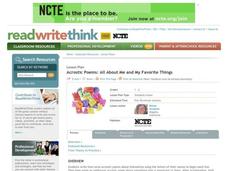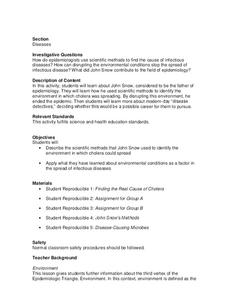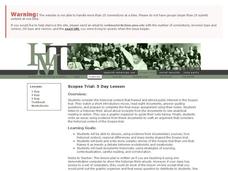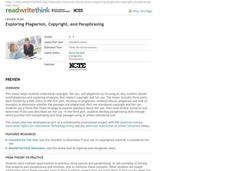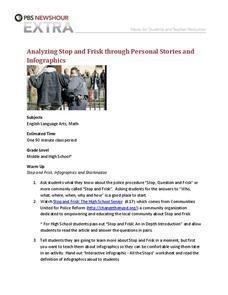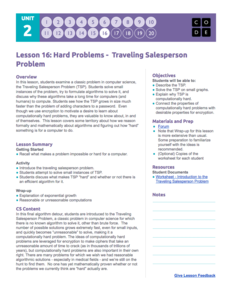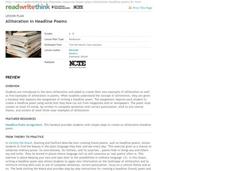Diablo Valley College
The Language of Sets and Set Notation
The basics of number theory and set notation are explained in a highly approachable way in a self-contained instructional activity and worksheet. Introducing the vocabulary and concepts from ground zero and building to more complex...
Santa Monica College
Lewis Structures and Molecular Shapes
Learners practice drawing Lewis dot structures, build molecules with model kits, and predict molecular shapes using VSEPR theory. The combination of written work and hands-on reinforcement benefits young scientists.
California Department of Education
Consonance and Dissonance: Creating Intervals for Emotions (CTE)
How are music and emotion related? Using lesson plan two of four from the Changing One's Tune: A Music Therapy STEM Integrated Project Series, scholars explore the connection between the two topics. They learn to recognize different...
Education Closet
Equal Rhythms
Engage young mathematicians in learning about fractions with this cross-curricular math and music lesson. After listening to and repeating different beat patterns, children realize that musical notes are just another way of representing...
National Council of Teachers of English
Acrostic Poems: All About Me and My Favorite Things
Budding poets create two acrostic poems, one for their name and another using a word of their choice. Over the course of five days, scholars compose, revise, publish, and share their work with their peers.
Centers for Disease Control and Prevention
Diseases
During a cholera outbreak, scientists presented two theories; one theory was based on miasma and the other on germs and contaminated water. The lesson looks at the scientific process for finding the real culprit.
National Security Agency
Multiple Representations of Limits
After an introductory activity to demonstrate the theory of a limit, additional activities approach a limit from graphical, numerical, and algebraic methods. The activity looks at the multiple ways of understanding and evaluating a...
University of Minnesota
Ethics of Dissection
There's an elephant in your classroom. That's right — a big, awkward elephant named Dissection. Sure, you'd like to talk about him ... but how? Whether you're a seasoned teacher or fresh out of student teaching, the topic of dissection...
media.yurisnight.net
Science Lesson Plan: Our Solar System: I Wonder?
Ever wonder why Pluto isn't considered a planet? Or how large the Earth is compared to the other inner planets? Explore the universe with a series of projects that simulate different aspects of our solar system. The activities require...
Virginia Department of Education
Finding the Formula and Percent Composition
Do you have mole problems? If so, call Avogadro at 602-2140. The lesson starts with pupils working independently to solve for molar mass of ionic compounds. Then they learn to solve for percent composition and later perform an...
ReadWriteThink
Literature Circles: Getting Started
Make reading more enjoyable and interactive with literature circles! Here you'll find detailed lessons to begin the literature circle process. Ten lessons introduce each role learners take on. Literature circle roles include...
ReadWriteThink
Style-Shifting: Examining and Using Formal and Informal Language Styles
Your high schoolers are probably versed in two languages: formal language, and informal conversation. Help them identify the correct language style for their audience and context with a thorough lesson and examples of different speech...
ReadWriteThink
Critical Media Literacy: Commercial Advertising
Commercial advertising—we can't get away from it, but do we realize just how often we are being advertised to? With this lesson, scholars analyze mass media to identify how its techniques influence our daily lives. Learners browse...
Historical Thinking Matters
Scopes Trial: 5 Day Lesson
Did Scopes violate the Butler Act? Why did so many Americans follow the Scopes trial? See analytical reading in action with a fantastic five-day lesson plan in which class members consider the historical context that provoked public...
North Carolina School of Science and Mathematics
Henry Kissinger and Detente
How did relations between the United States and the People's Republic of China evolve between 1950 and 1970? Your young historians will complete a timeline of events with evidence that the relationship between these two great...
ReadWriteThink
Exploring Plagiarism, Copyright, and Paraphrasing
Plagiarism, copyright, and fair use are the focus of a three-part instructional activity designed to inform scholars of how to properly cite others' work. First, pupils use a KWL chart to begin thinking and...
National Council of Teachers of English
A Bear of a Poem: Composing and Performing Found Poetry
Scholars work collaboratively to compose a found poem from one of their favorite stories. With a finished product in hand, class members form a circle and perform their work for an audience by taking turns reciting one line till the poem...
Read Write Think
Poetry Portfolios: Using Poetry to Teach Reading
Over the course of five periods, scholars create a poetry portfolio. They begin with a reading of the poem, Firefly. With a focus on vocabulary, learners reread the poem then look for sight words and other skills.
PBS
Analyzing Stop and Frisk Through Personal Stories and Infographics
How much can you learn about an important topic from a single image? High schoolers analyze an infographic that represents the number of stops performed during the Stop and Frisk police procedure. After building background information...
Code.org
Hard Problems – Traveling Salesperson Problem
Even computers find this to be a hard problem. In the eighth installment of a 12-part unit, young computer scientists learn about the traveling salesperson problem. They formulate algorithms to solve the problem and find out why it is...
Friends of Fort McHenry
A Just War or Just a War?
What, if anything, makes a war "just"? This is an interesting and important question to explore with your class, and you can utilize an excellent lesson plan to support your group inquiry. The American Revolution and the War of 1812...
Illustrative Mathematics
Waiting Times
Probability prevails in this assignment as youngsters determine the probability of finding a blue pen in a cereal box when they can come in blue, green, yellow, or red. Learners set up a simulation to determine the outcome of compound...
ReadWriteThink
Alliteration in Headline Poems
Poetry is everywhere you look! Create found poems using headlines from newspapers and magazines. Young poetry focus on creating alliterative phrases with words they find in headlines, tying their poems to a central theme.
National Council of Teachers of English
Writing Poetry with Rebus and Rhyme
Young scholars write rhyming poems using rebus. With pictures instead of words, authors create original work about things they love.
Other popular searches
- Math Number Theory
- Number Theory and Operations
- Number Theory 1
- Number Theory Rounding
- Number Theory Ed Helper
- Number Theory Ii
- Number Theory Edhelper
- Number Theory Concepts
- Number Theory Lesson Plans
- Math + Number Theory
- Egypt Math Number Theory
- Color Tiles Number Theory




